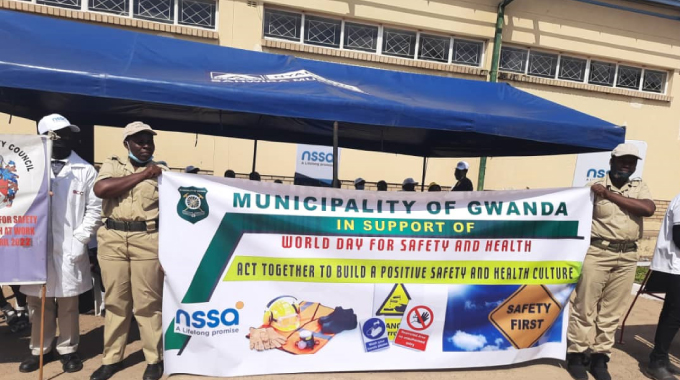Occupational accidents and diseases hamper achievement of ‘Vision Zero’

Yoliswa Dube-Moyo, Matabeleland South Bureau Chief
OCCUPATIONAL accidents and diseases that remain unaccounted for in the small and medium enterprises and the informal sector across the country are hampering efforts to achieve “Vision Zero”.
“Vision Zero” is a transformational approach to prevention that integrates the three dimensions of safety, health and well-being at all levels of work.
Safe and healthy working conditions are not only a legal and moral obligation — they also pay off economically.
International research on the return on investments in prevention proves that every dollar invested in safety and health generates a potential benefit of more than two dollars in positive economic effects.
In a speech read on his behalf by Matabeleland South Provincial Affairs and Devolution Minister Abednico Ncube during the World Day for Safety and Health at Work commemorations in Gwanda last week, Minister of Public Service, Labour and Social Welfare Professor Paul Mavima said eight fatalities had been recorded in workplaces across the country between January and March this year compared to three fatalities that were recorded during the same period in 2021.

“This day draws the world’s attention to work-related injuries, diseases and fatalities. An overview of occupational injuries in the last three years shows that in 2021, 5 641 injuries were recorded with 42 fatalities while in 2020, there were 3 528 serious injuries and 45 fatalities. In 2019, there were 5 082 serious injuries of which 49 were fatal. During the first quarter of this year, January to March of 2022, we have already recorded 822 serious injuries with eight fatalities compared to 1 495 serious injuries and three fatalities recorded during the same period in 2021,” said Prof Mavima.
He said these statistics were an underestimation of the reality owing to rampant under-reporting and non-reporting that characterises the generality of work places in most developing countries globally compounded by occupational accidents and diseases that remain unaccounted for in the small and medium enterprises and the informal sector.
“These statistics are a stark reminder of the need to strengthen our social dialogue processes in order to build a strong preventive safety and health culture.
To this end, it is essential that we create a preventive safety and health culture as defined by the promotional framework for Occupational Safety and Health Convention 2006.
A convention which the social partners need to consider for ratification building and maintaining a preventive safety and health culture in which the right to a safe and healthy working environment is respected at all levels where employers and workers actively participate in securing a safe and healthy working environment,” said Prof Mavima.
He said this is possible where there’s a system of defined rights, responsibilities and duties and where the principle of prevention is accorded the highest priority.
“Our social dialogue both at national and enterprise level must function to create hazard-free work environments,” said Prof Mavima.

Minister Professor Paul Mavima
According to the International Labour Organisation (ILO), around two million workers die every year due to occupational accidents and diseases and at least 402 million people suffer from non-fatal occupational injuries.
Joint estimates by the World Health Organisation and ILO highlighted that from 2006 to 2016, work related diseases were responsible for 81 percent of all work related deaths, with deaths due to occupational injuries accounting for the remaining 19 percent of work related deaths.
The occupational risk factor with the largest number of attributable deaths was exposure to long working hours
Occupational accidents and diseases are estimated to contribute to 5,4 percent of annual global gross domestic product lost.
Representing the Employer’s Confederation of Zimbabwe, Mr Joe Kahwema said the rights of employees must be upheld.
“The Government with involvement of the Ministry of Labour have made the employee the person with the final word as to whether or not they can work under any situation. Unfortunately, most of our employees, because of the poverty at home, will not leave a job because of poor working conditions.
They would rather sacrifice their lives or their limbs to do what the unfair employer will be demanding. We need to remind each other that we hold the final word and there’s no one who should be able to fire any employee because they have refused to work unsafely,” said Mr Kahwema.
World Day for Safety and Health at Work is commemorated the world over on April 28.

This year, the commemorations were held under the theme, “Act together to build a positive safety and health culture”.
The commemorations were held outside Harare for the first time in line with Government’s devolution policy.
In commemorating the day, a march led by the army band from Glow Petroleum to the Nssa Complex kicked off the festivities where Victory Siyanqoba Trust, drum majorettes and a traditional dance group from Sabiwa Primary School entertained the gathering. – @Yolisswa












Comments